West Timor
A Night in Tamkesi Traditional VillageWest Timor: A Night in Tamkesi Traditional Village
My travel buddy, Tim, and I arrived in Kefamenanu (lovingly called Kefa by the locals) after a 4 hour bus journey from Kupang that ended up taking 7 hours. Our target? Tamkesi, a traditional village where locals still live as they’ve always lived (well, plus a few solar panels) in the hills above Kefa. The journey was long, but scenic, passing through mountain roads and rural villages, and there was a short break in Soe, a mountain town in central West Timor, to stock up on snacks before continuing to Kefa.
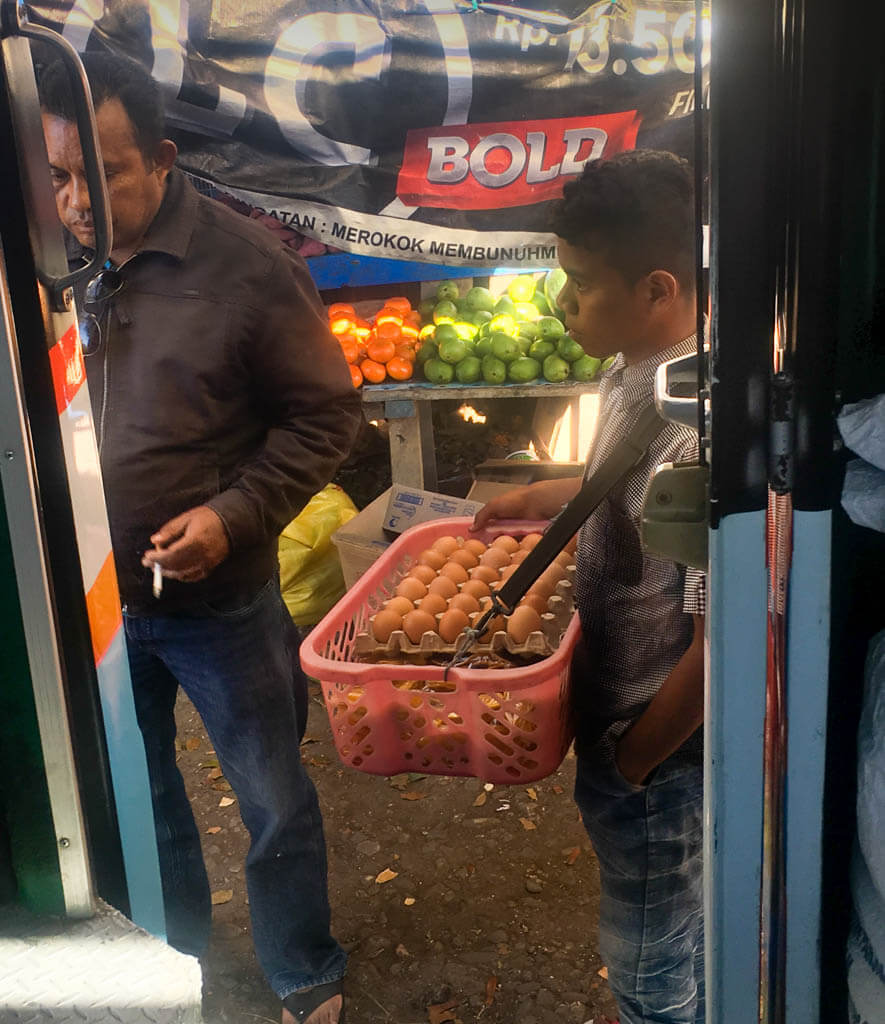
A local boy selling boiled eggs and other goodies in Soe.
We arrived in Kefa in the early evening and tried to check into the Hotel Victory, but they wanted 350k rupiah for a twin room, which seemed exorbitant, and they refused to negotiate! Guys, this is Indonesia! Asking around, someone suggested the Hotel Ariesta as a budget-friendly alternative. It was definitely less plush and more local, with no hot water and a bucket shower, but perfectly good enough for us and only 200k for a twin room. We were sold! And anyway, after a week and a half in Timor and Alor island, we were used to such conditions.
That night, we looked around for a bar or restaurant where we could have a couple of drinks and maybe some food, but this was really small town Timor. We found one nice outdoor cafe, but they didn’t sell alcohol and no, we weren’t allowed to bring our own. So of course we walked out. Around the corner we found a little independent convenience store and bought a couple of Bintang beers there, then sat outside on the street to drink them. Just as we sat down, a pickup pulled up and a guy from the cafe called over to us that actually we could drink them there! For some reason they had changed their minds.
We ordered some snacks in the cafe to keep the owner happy, including some truly awful French fries with a weird sweet powder sprinkled over them, and drank our beers. Before long, the bar owner who’d called us from the pickup joined us and he and his mates started giving us tips on how to get in with the local villagers when we visited Tamkesi the next day. They were very friendly, and ended up driving us to the local market to buy cigarettes, betel nut, mustard leaves and lime as gifts.
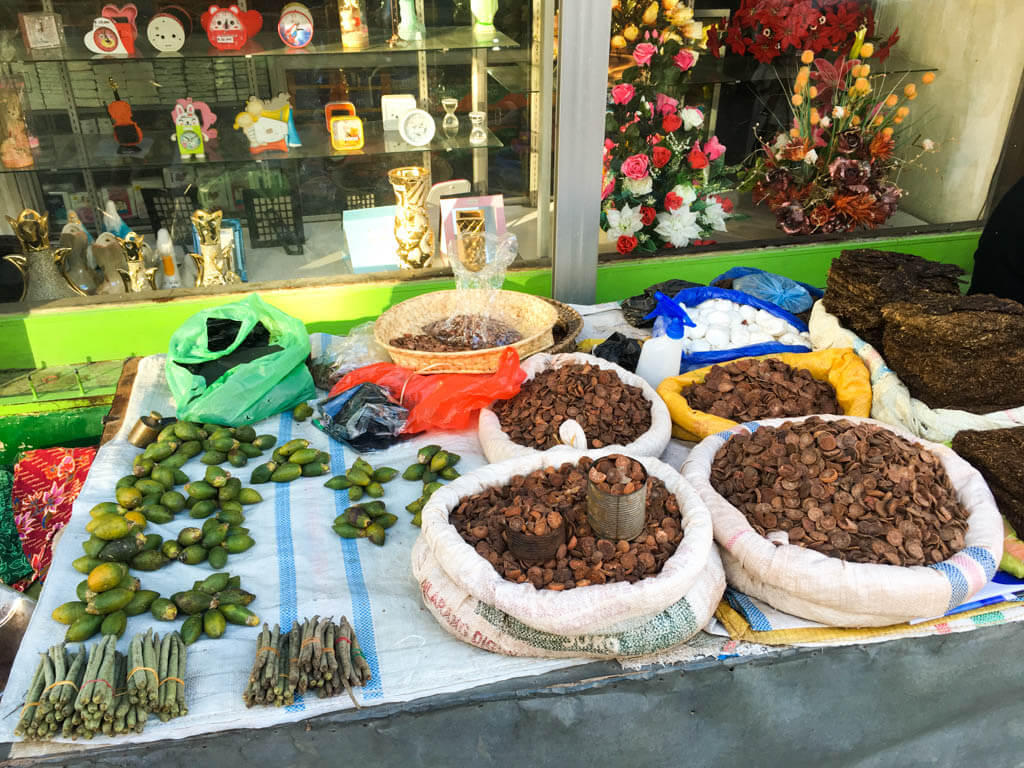
The local market – dried betel nut (front right in sacks), mustard sticks (front left) and powdered lime (back right, in little plastic bags.
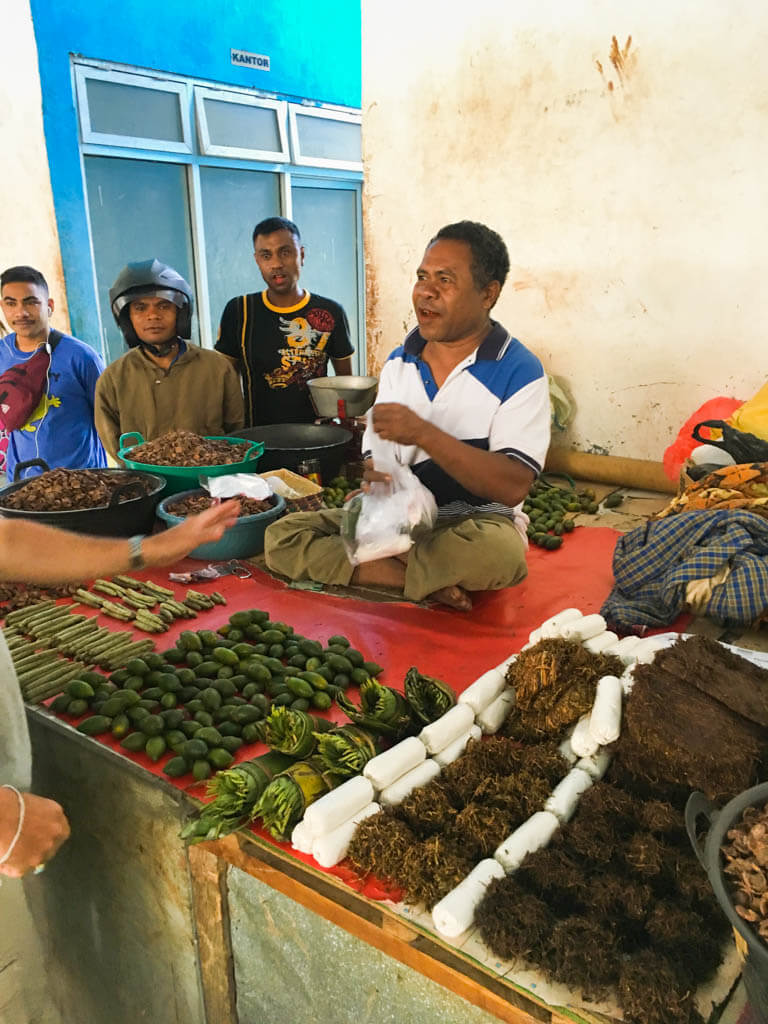
We gained quite an audience in the market. Not too many travellers come here and especially not to buy betel nut!
After we’d bought our gifts, our new friends invited us to a wedding reception that very night. Which somehow then turned out to be a birthday party. But was actually some kind of wedding anniversary. It was all very confusing, but it was fun to join a local Timorese party, especially as we were the only non-locals. There was laughing, chatting, dancing and selfie taking, and a few people even spoke some English. I met some interesting people, including an openly gay local couple, one of whom from Timor Leste. Timor is very Christian, so I was pleasantly surprised at how open they were about their relationship. There was also a Police car waiting outside to make sure there was no trouble and to shut the party down at 1am. Apparently, by law, parties must end by 12 o’clock, but the Police were being nice and let them go on an hour later in this case (I guess they had good connections). Our new friends suddenly decided to leave at about 12:30, although we never really figured out why, and dropped us off at the hotel on their way home.
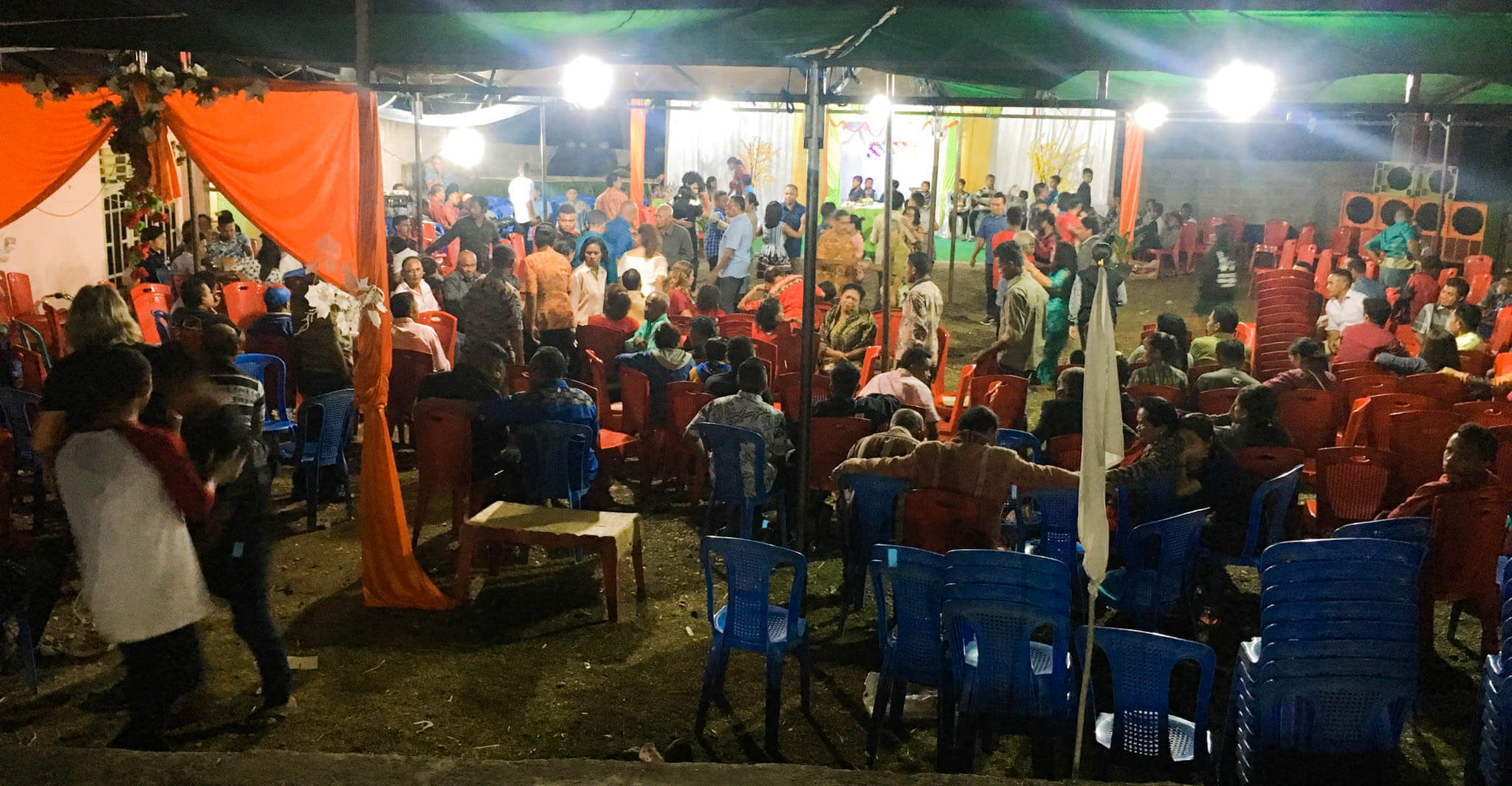
A Timorese party wedding, birthday or anniversary party, we never did quite work out which it was.
The next morning we got up early and tried to arrange motorbikes for the ride to Tamkesi. The hotel couldn’t help us, so we went out on the street and found a few local kids who were happy to rent us their bikes for 24 hours for 100k rupiah each. We waited a bit while they brought the bikes over, and they turned out to be almost new Honda Beats, the best ‘rental’ bikes we had all trip (although that wasn’t saying much given some of the other heaps of junk we hired).
Bikes sorted, we checked out of the hotel and headed into the mountains, following a mixture of local advice and Google Maps towards Tamkesi. For the first couple of hours, we cruised along the path shown on Google Maps, stopping to fill up with fuel and eat some chicken with rice just before the final stretch of tarmac ended and our road became a dirt track. We also bought an extra portion of food each just in case, as we weren’t sure that there would be any food for us in the village even if we did stay overnight. The route was beautiful, passing through rural villages and rice paddies.
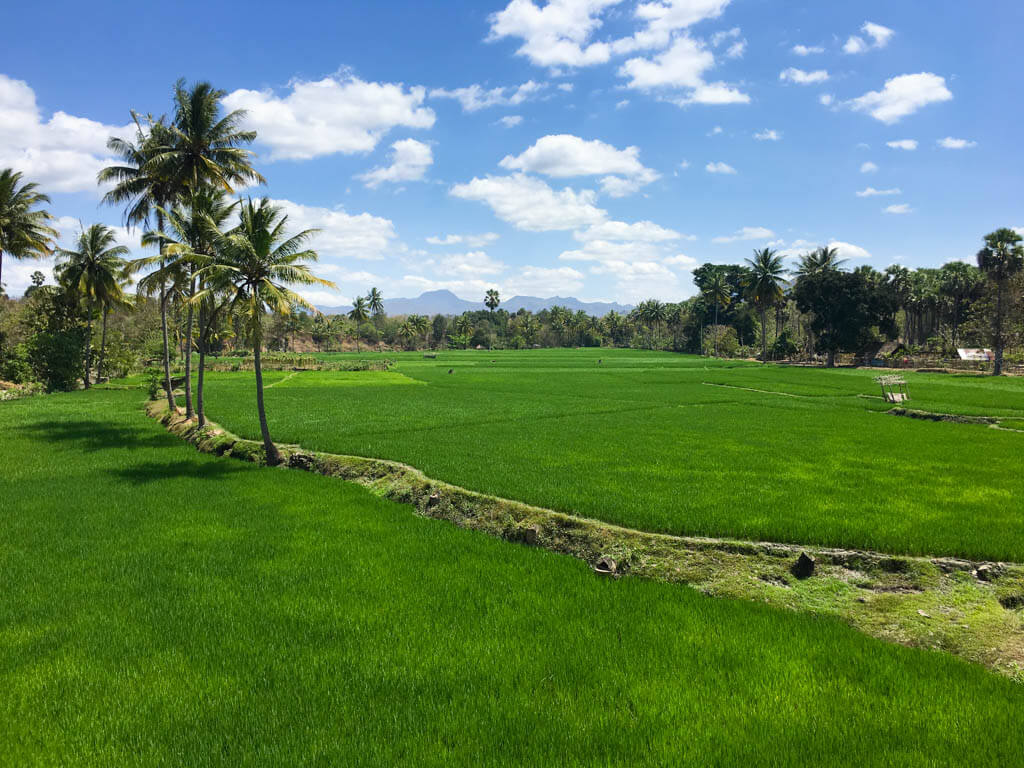
The scenery between Kefa and Tamkesi is a pleasure to behold.
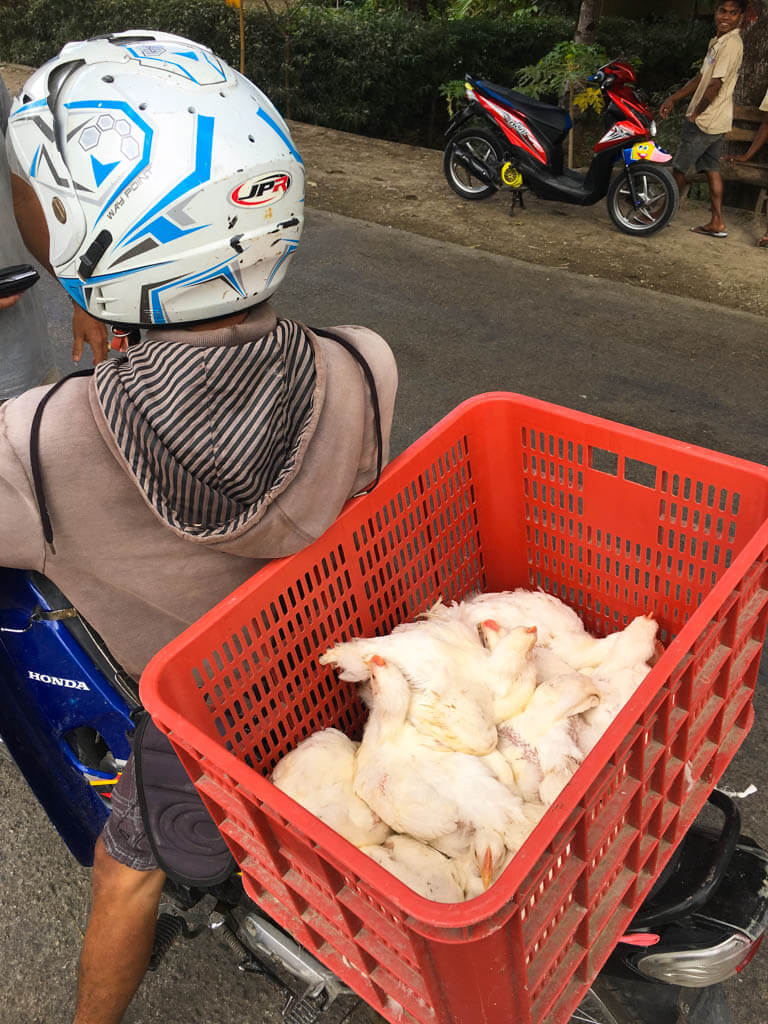
We stopped and chatted with a guy taking some poor chickens to market on his bike.
Tim’s Bahasa Indonesian is good, so in Bali communication is very easy when he’s around, but somehow in Timor peoples’ way of communicating is quite different. Sure there are different dialects, but there also seems to be a different way of thinking, especially in the case of everyone saying yes to everything you say, even if they have no idea of what you’re talking about.
Google Maps got us so far, but then we missed a turning and stopped to check directions with a local man on the road. Oh yes, he said, just keep going, Tamkasi is just up ahead. The next person we asked also confirmed, “Yes, yes, you are right, the traditional village is in this direction”. It was when the dirt road became so bad that we could hardly keep going that we began to get a bit suspicious and asked another local couple heading the same way as us on a bike. Oh no, Tamkesi is in the opposite direction. You need to go back for about 7km and then take a left… On those roads 7km was a long way!
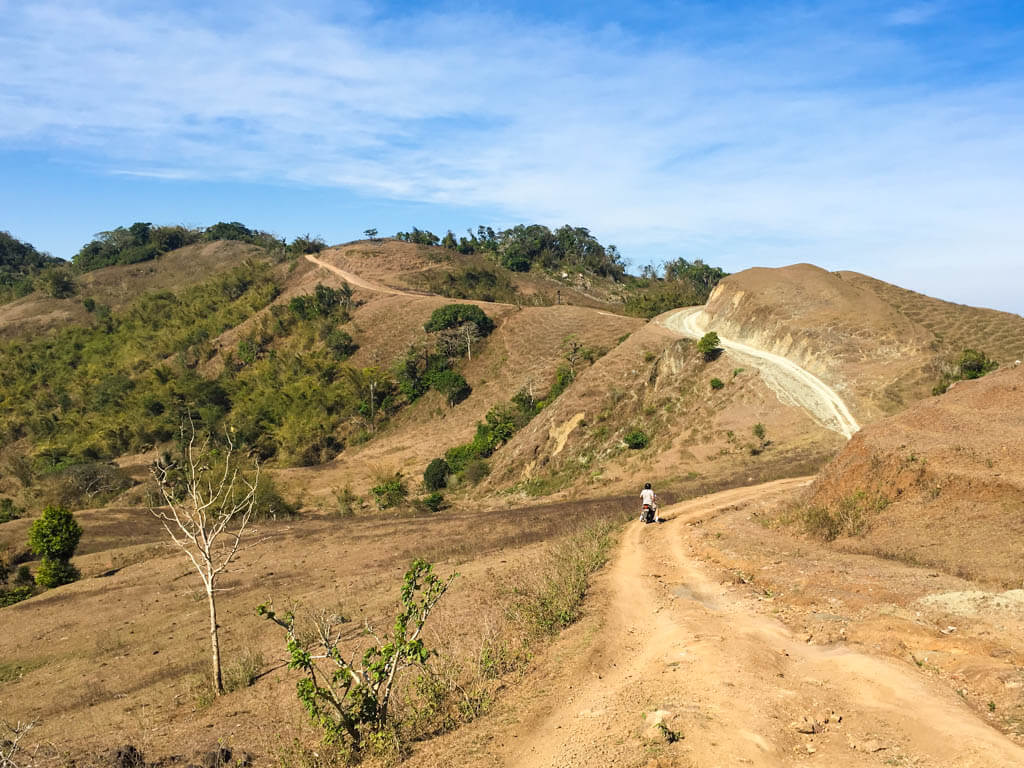
The road to Tamkesi was beautiful, but treacherous in places, with steep gravelly slopes.
An hour wasted, but with some interesting obstacle course driving under our belts, we eventually found the correct road and arrived at the bottom of a hill with a rocky path leading up towards the village. We parked our bikes and prepared our gifts for meeting the local villagers.
We climbed the hill and arrived at the lower level of the village, which had a single hut outside of which a group of village ladies greeted us politely, but slightly coldly. Tim launched into his usual Bahasa stories and loosened them up a bit by passing around the dried betel nut we’d brought for them. Eventually, they asked for 20k rupiah (€1.28/$1.41), the fee for proceeding up the hill to the main village. I was intrigued to see a very modern addition to the roof of the hut they were standing by – a couple of solar panels glistening in the afternoon sun on the thatched roof!
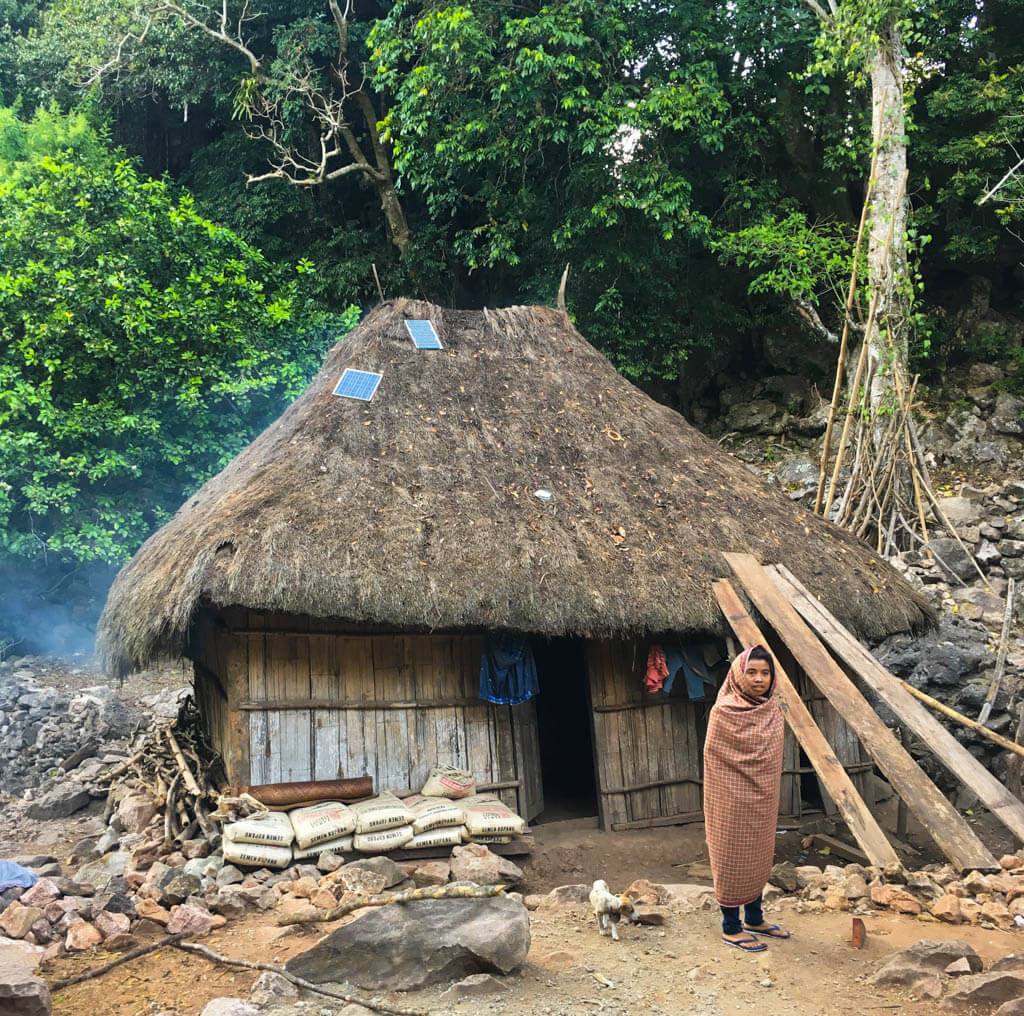
Solar panels glisten on the roof of a traditional hut at the lower left of Tamkesi village.
We climbed the rough stone steps leading to the upper level of the village and were surprised to pass a big area of scorched earth with large charred logs and burnt cooking equipment scattered on the ground. At the top, we were ushered into a covered seating area where Tim repeated his usual act while I handed out cigarettes and betel nut to everyone. The elders were obviously intrigued to see a foreigner speaking fluent Bahasa and we were able to build a rapport that I think few tourists would manage. Tamkesi is quite well known, as there are not many traditional villages left in West Timor, so it does get quite a few visitors, but most of the villagers don’t speak English and of course most of the foreigners don’t speak Bahasa. There was actually a German-looking couple there at the time of our visit, but they just had a quick look around and didn’t stay long.
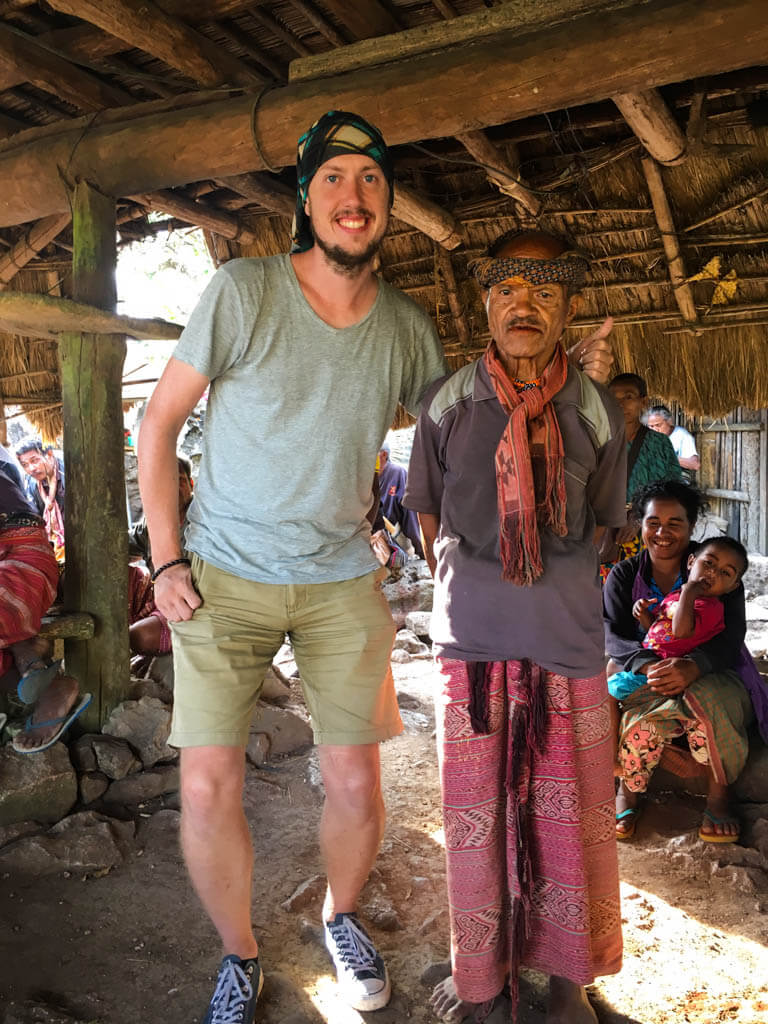
A photo op the village chief. Photo: Timothy Hawksworth.
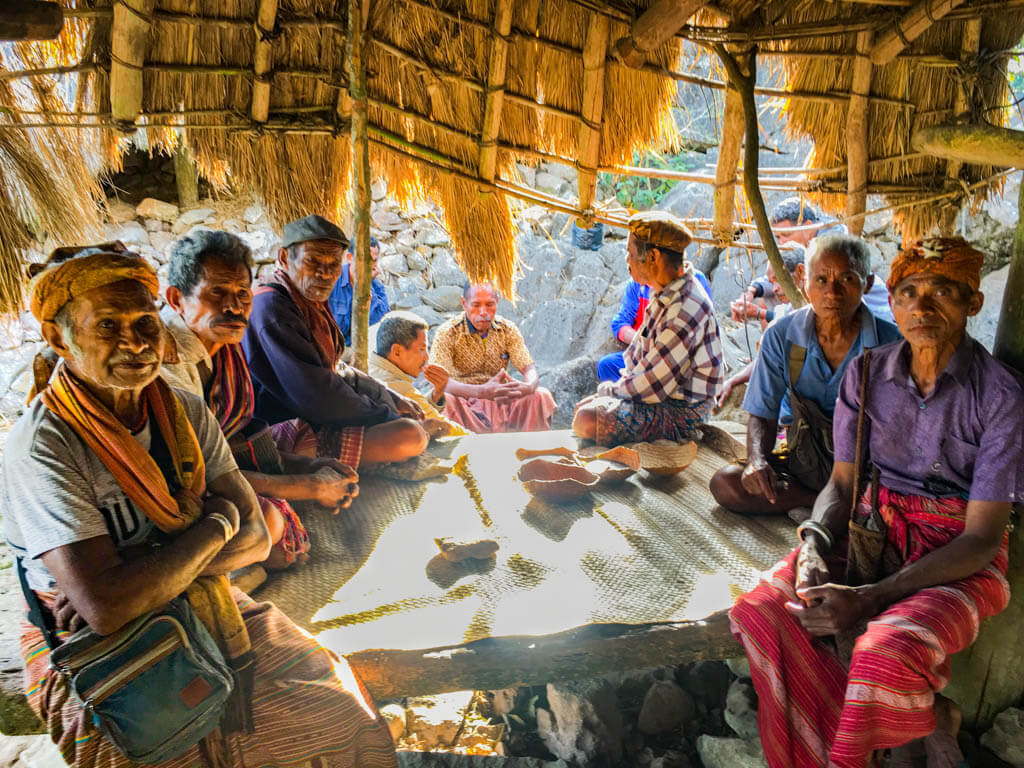
The village elders.
As dusk began to fall, the villagers asked if we’d like to climb the rocky hill next to the village, and after a short debate over whether it was safe to leave our bags there (mine contained my blogging laptop), we decided to go for it. A small group of younger villagers, including some very enthusiastic (not to mention very cute) children led the way. It was quite steep and rocky, although nowhere near as treacherous as Mount Fataleu, which we’d climbed the week before. The view from the top was spectacular and we spent quite a while posing for photos with our entourage at the top, while the sun gently set over the horizon. It was beginning to get cold as we climbed back down and when we reached the bottom a kind village lady appeared with a tray of hot coffee, which we drank thankfully.
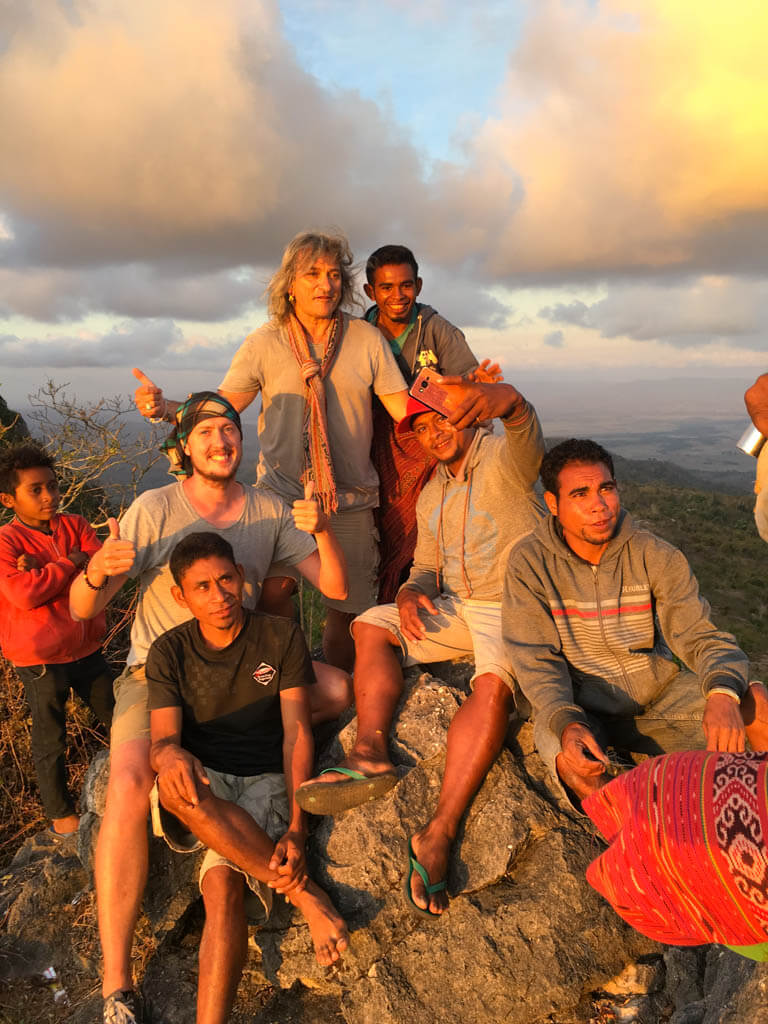
A group photo on top of the mountain.
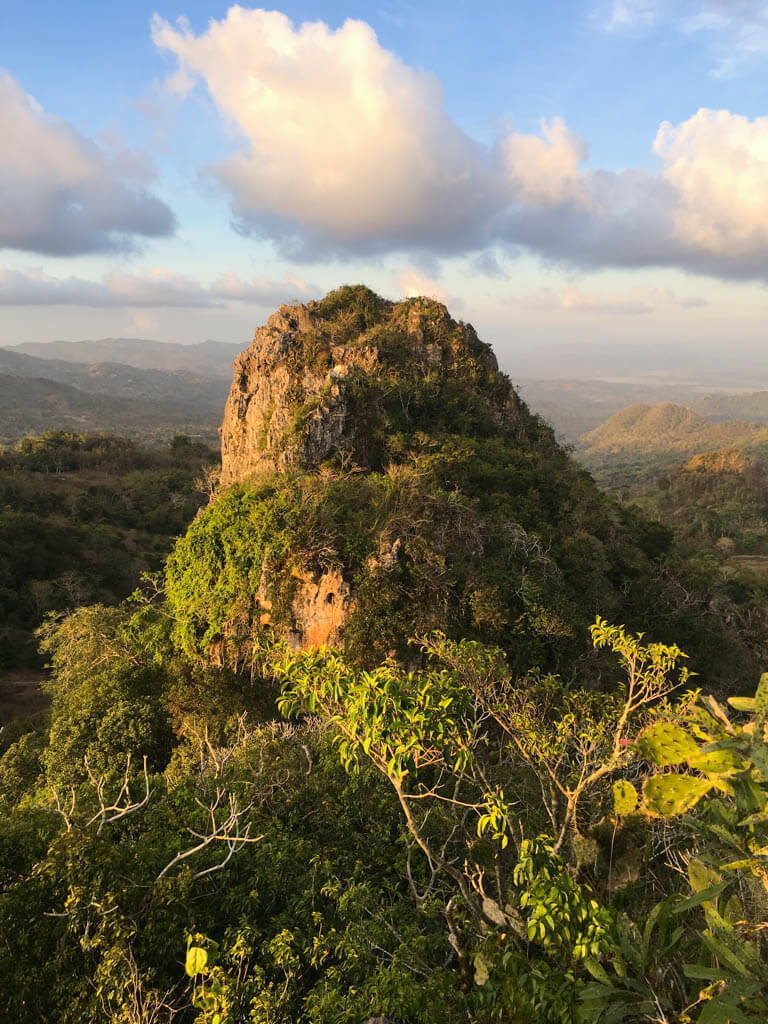
The view from the mountain over the surrounding countryside.
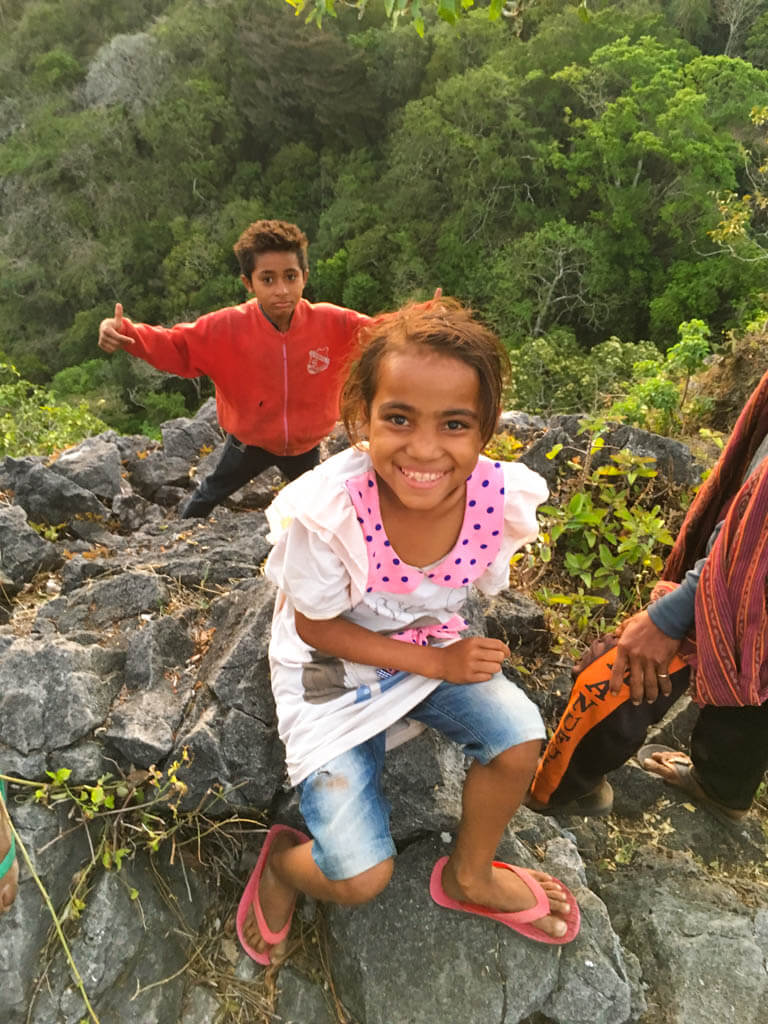
The cutest guides ever! All they side to use was “hati hati” (be careful) over and over again, and giggled every time we repeated it.
We enquired about staying the night and the villagers said we were welcome, but unfortunately the guest hut and five other wooden huts had burnt down the previous week, so we would have to sleep outside. That explained the charred ground we had noticed on the way up. They had no idea what had started the fire, but it was a big disaster for them, as it had consumed about a third of their village and now there was not enough accommodation for everyone. We agreed to sleep outside in the covered area where we were seated, although there were no walls, so the wind could just blow right through, and presented the village chief with a small monetary gift in thanks. The village boys offered to move our bikes from where we’d left them at the bottom of the hill into a covered area nearby and we gratefully accepted, passing them the keys.
The rest of the evening passed in a blur. A few of the younger villagers spoke quite good English, so I was able to communicate freely with them while Tim chatted in Bahasa with the elders. We laughed and joked and chatted about life in the traditional village. They receive a few tourists, which brings in a little money, but village life is not easy and they are poor. One kind girl noticed I was shivering in the chill night air and lent me a traditional blanket. Their blankets are a beautiful part of their culture and have been made using the same traditional methods for generations. They are high-quality hand-knitted affairs made by the village ladies for their families and it takes approximately three months to make a single blanket. However, the quality is unmatched and they easily last for 20-30 years.
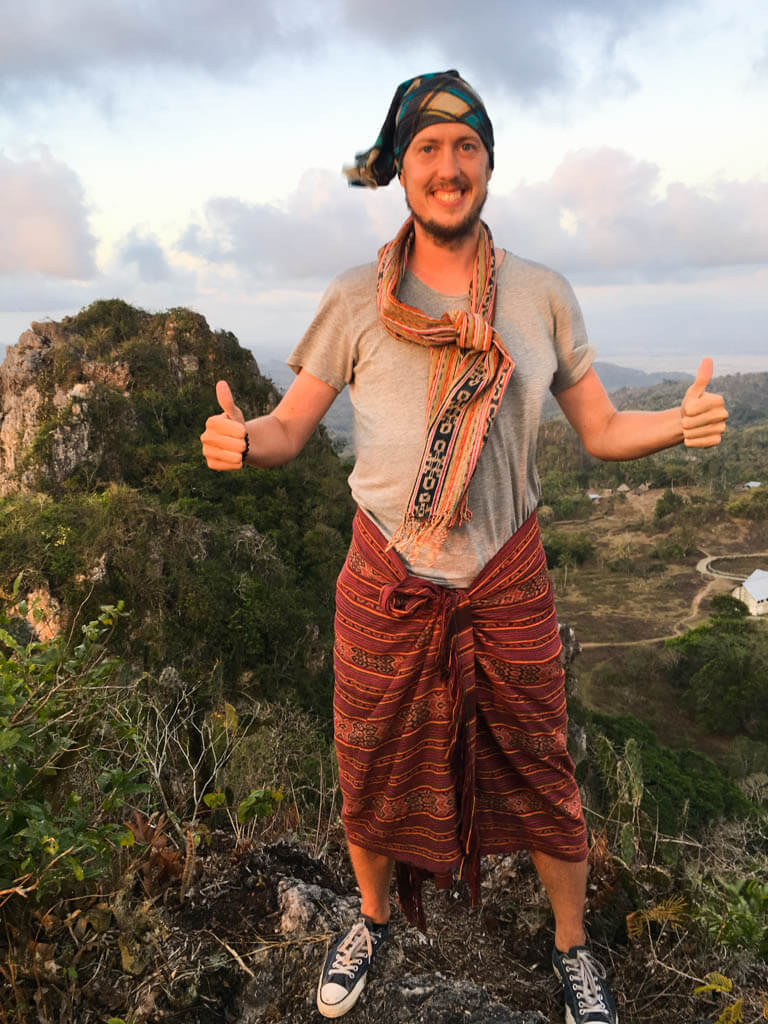
Me, posing in a traditional blanket earlier in the day. Could hardly suppress the urge to yell “Freedom!” from the top of the hill.
After a while, it was announced that dinner was ready, and we were led up to a communal cooking and eating area. The facilities were basic and my new friends told me that this was only temporary. Before the recent fire, each family had had their own cooking area and cooked and ate separately, but since so many had lost their houses, the community had decided to cook together until they could rebuild the destroyed homes. The food was basic – rather grisly bits of pork with rice and some vegetables – but nice enough and we queued up with everyone else to serve ourselves.
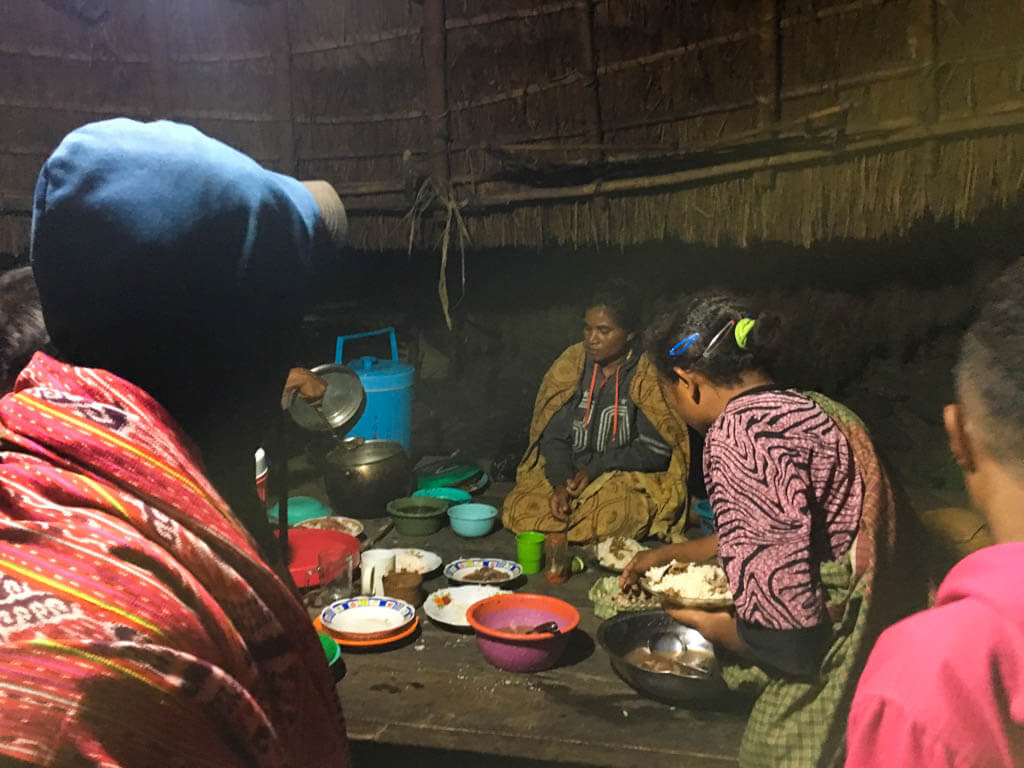
A lady watches as the villagers serve themselves at dinner.
As we ate, of course, some home-brewed moonshine appeared and both Tim and I had more than our fair shares. The villagers became noticeably more exuberant after the alcohol, and some girls who’d been quiet until then plucked up the courage to ask to take photographs with us. More betel nut was passed around and even I joined in, chewing a couple of pieces with lime and mustard leaves. After enough drugs of various types, practically the whole village got in on the photo taking. They may get quite a few foreign visitors, but I think the villagers liked that we hung out and talked with them at such length, so they also felt comfortable in our presence and were interested in our stories.
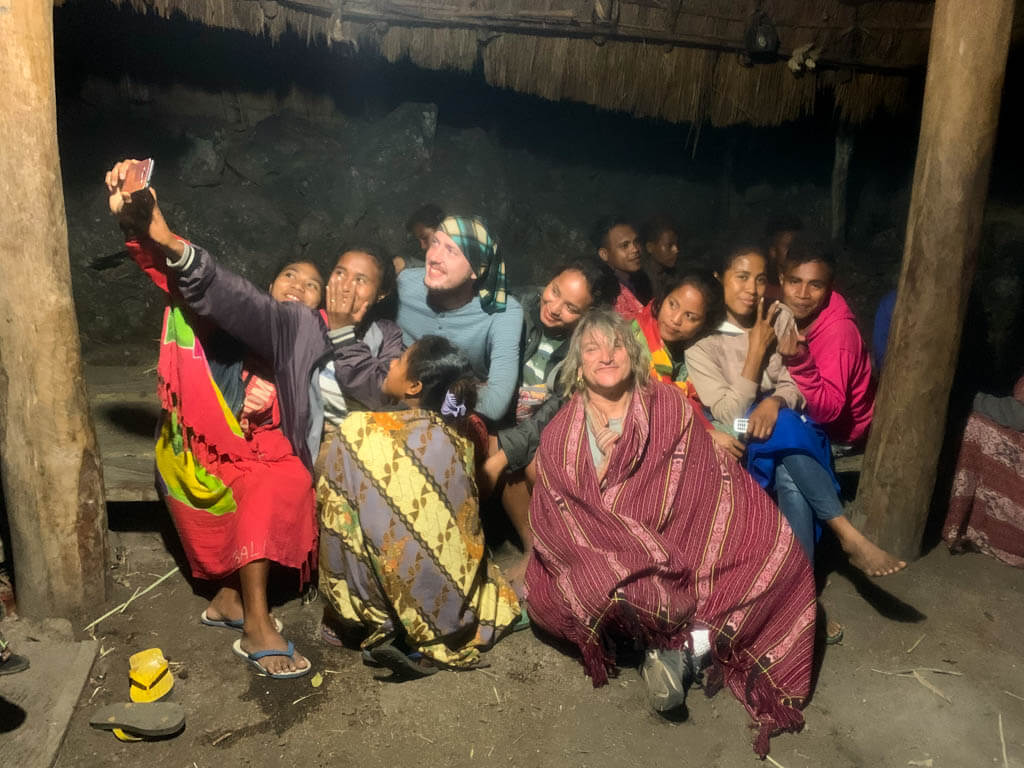
Taking selfies with the villagers. Note Tim’s traditional blanket (and vacant expression).
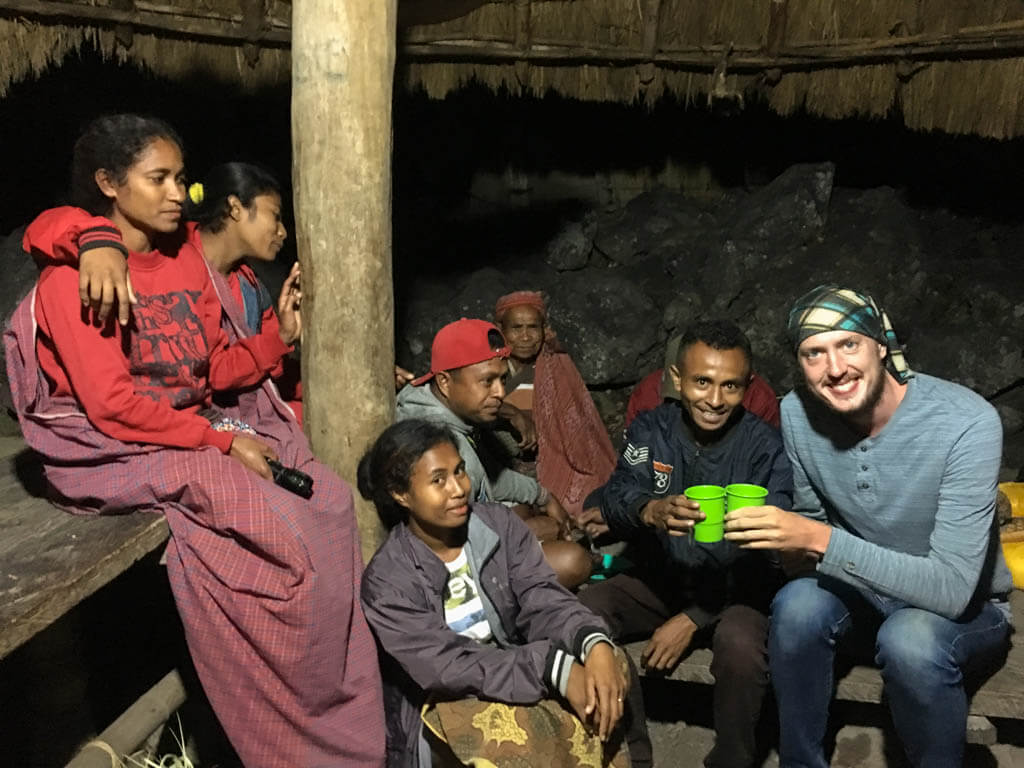
Drinks all round.
Eventually, the evening wound down and we returned to the seating area where we curled up and tried to sleep. Luckily, I’d brought a light jumper and a pair of jeans with me, but even with the blanket over these, the night was the coldest I remember in a long time. I kept waking up shivering and trying to pull the blanket closer to keep out the chill night air, but whatever I did I still shivered. Maybe I didn’t drink enough moonshine.
When eventually morning came, I got up to find Tim virtually unrecognisable. His lips had swollen up like huge frankfurters that impeded his speech! Turns out that the lime we ate with the betel nut has side effects. I’d had three pieces and the inside of my mouth felt like it was covered in hundreds of tiny scratches. I asked Tim how many he’d had and, after all the alcohol he’d downed as well, he couldn’t even remember! What he did keep repeating was that it was one of the best nights of his life, so obviously he’d enjoyed it.

The dangers of too much betel nut and lime.
We returned the blankets that had been lent to us the night before and asked for our bikes. It took the villagers a while to figure out who actually had the keys, but eventually they were returned to us and we waved goodbye to our hosts. The boys led us down the hill to a covered area where we collected our bikes and started back onto the road. At this point, I realised that my bike, which I’d filled up with fuel while we were still on the sealed road the day before, and which had still had a least half a tank remaining when we’d arrived, was running on empty. Then I noticed it was far more mud stained than the night before. Tim’s was the same. Obviously, the boys had had some fun with our bikes the previous night. A quick inspection didn’t reveal any damage and half a talk of fuel is only a couple of Euros, so in the end we drove on and filled up again as soon as we had the opportunity. However, after having such an enjoyable evening with the villagers, I felt saddened that they had treated our bikes in this manner without even asking if they could borrow them.
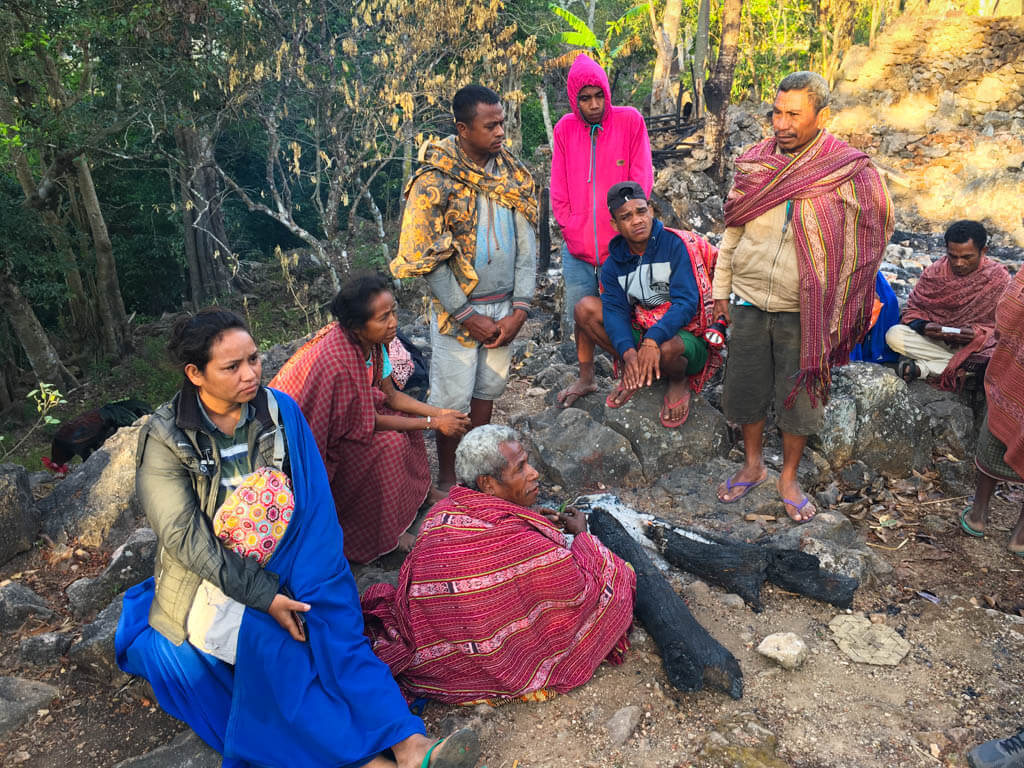
Goodbye Tamkesi.
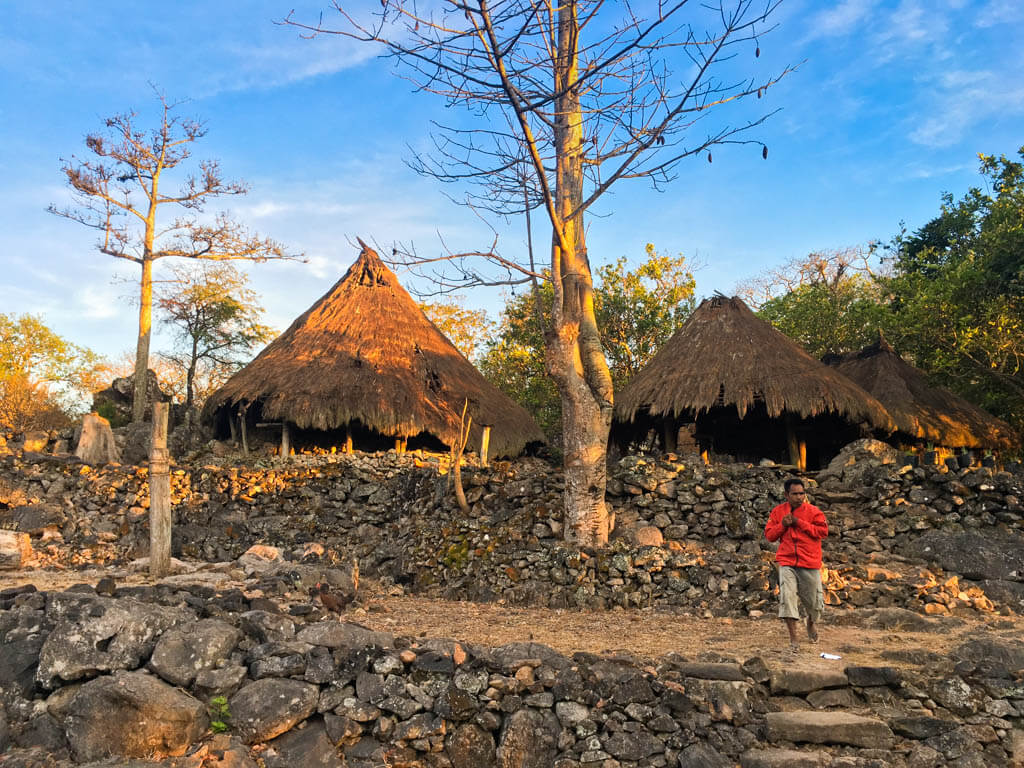
Tamkesi in the morning sunshine.
The return journey was very smooth, as we already knew the route, and we were even able to figure out a shortcut from the map. Halfway back, we stopped and I ate the extra portion of rice and chicken that I’d bought the day before for breakfast. Tim tried to do the same, but his mouth felt like it had been cut with a thousand tiny razor blades and he only managed a couple of mouthfuls. A stray dog that was wandering around the roadside got very lucky that day, unlike Tim, who didn’t manage to eat anything else for the rest of the day! Arriving back in Kefa, we filled up the bikes to the same level of fuel that they’d had the previous day, before returning them to the boys we’d rented them from. The fuel gauges didn’t react instantly to the new fuel though and an ugly argument ensured.
Tamkesi is about as traditional a village as you will find in West Timor and our visit was certainly an experience, although it is obviously visited by quite a few tourists and is nowhere near as authentic as the villages I visited in Papua New Guinea. However, the villagers are very friendly and if you put in the effort to really connect with them, they will reciprocate. A little gift of betel nut goes a long way too.
More Stories from Indonesia
This article is the last in a series of three articles I’ve written about my adventures in West Timor. If you enjoyed it and want to know more, check out the others here:
West Timor: Crystal Pools and the Best Pork in the World
West Timor: The Terrifying Ascent of Mt. Fatuleu
West Timor: A Night in Tamkesi Traditional Village
I loved Indonesia and also spent time in Jakarta visiting some off-the-beaten-track places, such as Sunda Kelapa harbour. Check it out here:
Sunda Kelapa Harbour: Exploring the Old Port of Industrial Jakarta
I also spent almost two weeks Couchsurfing in the Jayapura region of the fairy tale land of West Papua:
West Papua: The Lake Where Dreams Come True
Useful Tips
- Buses from Kupang to Kefamenanu (and Soe, a town in the mountains that also has traditional villages nearby) depart frequently from the bus station in Kupang before 10am. After 10 they are much less frequent, so it’s better to take a bemo (minivan) to a district of Kupang called Oesapa. From here, you can catch a minibus to Kefamenanu or Soe (there is only one main road through West Timor, so the same bus stops at both places). The cost is 25k (€1.60/$1.77) rupiah to Soe and 50k (€3.21/$3.54) to Kefamenanu. Buses generally wait until they’re more-or-less full before departing. A bemo from other parts of Kupang to Oesapa should cost 3k (€0.19/$0.21) rupiah (this is standard throughout the city).
- The Hotel Victory and the Ariesta Hotel are both clearly marked on the Maps.Me mobile app and walking distance from each other (Kefa is not big). Ariesta was willing to negotiate on the price, whereas Hotel Victory wasn’t, but that might have just been the person we spoke to, so you should definitely still try.
- We gave the villagers at the lower level of the village 20k rupiah (€1.28/$1.41) between us to let us proceed to the higher level and then gave the village elders 100k rupiah (€6.42/$7.07). This included accommodation (which was just sleeping outside anyway) and the evening meal we had with them. We also brought gives of cigarettes, betel nut, mustard sticks and lime. These cost a total of 160k rupiah (€10.27/$11.32) in the village market in Kefa.
- A few of the younger villagers do speak passable English, but it will be difficult to build much rapport with the villagers if no one in your group speaks Bahasa.
- Don’t give your bike keys to the villagers. While they were generally great people, the fact that they rode our bikes until they were almost out of fuel without asking was dishonest and quite disappointing. While I don’t care about the fuel, if there had been damage to the bikes we would’ve had a serious issue when we returned them to their owners.
- Don’t eat too much betel nut, you’ll definitely regret it the next morning! Unless of course you want to look like Tim.

Recent Comments